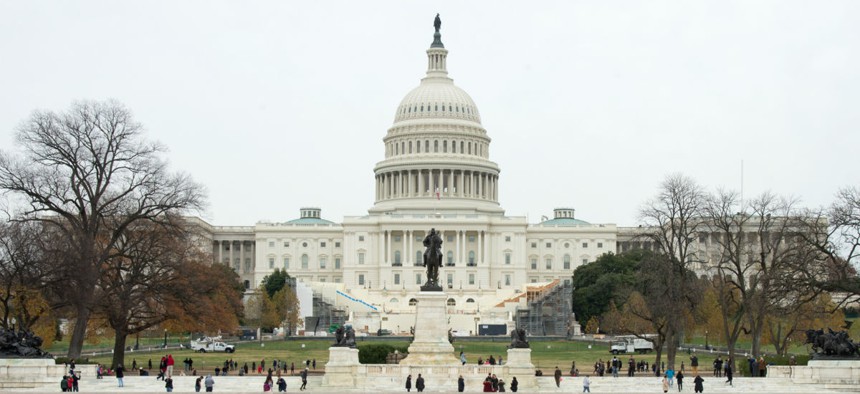
Architect of the U.S. Capitol
Congress’ Big Plans for Federal Service, Locality Pay Loophole and More
A weekly roundup of pay and benefits news.
All indications suggest that 2017 is going to be an interesting year for federal employees in the pay and benefits arena. Before we get to that, here’s a reminder that Washington area feds (at least most of them) will see at least one concrete benefit from new administration—an extra day off on Jan. 20 for the Trump inauguration. But for those who weren’t regularly scheduled to work that day, there won’t be any “in lieu of” holiday, OPM said.
As for what feds can expect this year, Rep. Jason Chaffetz, chairman of the House Oversight and Government Reform Committee, promises to focus more on the “reform” part of his job description, Eric Katz reported Monday. Chaffetz said he would push legislative changes such as eliminating defined-benefit pensions for new federal employees and making it easier for agencies to dismiss employees accused of sexual misconduct. As we explained:
On the retirement issue, Chaffetz said his committee will push to move new federal hires to receive only a defined-contribution benefit, like the Thrift Savings Plan. He said he must “still work the math” as to whether those employees would receive a more generous government contribution toward the 401(k) equivalent to make up for the loss of a pension, but did promise a “healthy” match from agencies. Chaffetz promised to protect employees already vested in their pensions, saying he did not want to “unduly scare” an employee already on the job for seven years and it would be “difficult” to go after existing workers’ retirements.
Chaffetz said he’s not sure whether he will pursue the changes through a standalone bill or budget reconciliation.
Chaffetz isn’t the only Republican lawmaker with plans to alter federal service. Rep. Todd Rokita, R-Ind., expects to reintroduce the Promote Accountability and Government Efficiency Act to turn all new federal workers into at-will employees. The measure would strip new federal hires from due process protections, allowing supervisors to fire them without notice or the opportunity to appeal. It would also allow agencies to suspend current employees without warning and would prohibit any employees not receiving top marks on their performance reviews from getting a pay raise, Eric Katz reported.
Those are just a few of the measures the new Congress has in store. You can find more details here.
Lest anyone is getting all nostalgic for the Obama Administration, Kellie Lunney has a detailed look at the soon-to-be former president’s federal pay and benefits legacy. (Spoiler alert: George W. Bush was a more generous boss when it came to pay.)
The National Finance Center noted an interesting effect of the 2017 pay raise in some cities, stemming from the fact that the locality pay rate for GS employees may not exceed the rate payable for Level IV of the Executive Schedule ($161,900 in 2017). In its annual pay raise bulletin, the center wrote:
The locality rates for GS-15/05, GS-15/06, GS-15/07, GS-15/08, GS-15/09, and GS-15/10, in the San Jose-San Francisco-Oakland locality area; the locality rates for GS-15/07, GS-15/08, GS-15/09, and GS-15/10 in the Houston and New York locality areas, the locality rates for GS-15/08, GS-15/09, and GS-15/10 in the Alaska, Boston, Chicago, Hartford, Los Angeles, San Diego, and Washington-Baltimore locality areas; the locality rates for GS-15/09 and GS-15/10 in the Detroit, Philadelphia, and Seattle locality areas; and the locality rates for GS-15/10 in the Dallas-Fort Worth, Denver, Miami, Minneapolis-St. Paul, Portland, and Sacramento locality areas would otherwise exceed Level IV rate. Therefore, these identified GS-15 steps in the applicable locality areas are limited to $161,900 for 2017.
December showed an uptick in the number of federal employees putting in their retirement paperwork, according to new statistics from the Office of Personnel Management. OPM received 5,483 new claims last month, up more than 400 over the previous month and more than 800 over the previous December.
The claims backlog typically spikes during the period between mid December through mid-February. Nonetheless, OPM managed to process more claims than it received last month (6,405), which whittled down the backlog to 15,097, a 6 percent decrease over the 16,019 backlogged claims OPM held at the end of November.
Eliminating the retirement backlog has proved elusive for OPM. The agency had hoped to eliminate it by 2013, but then sequestration changed those plans. Recently the inventory has fluctuated throughout the year but has remained stubbornly above 10,000.
While probably not retiring, Peace Corps Volunteers leaving the service (and even those staying) will soon have a new benefit: entrepreneurship training, compliments of the Small Business Administration. The two agencies expect to sign a Memorandum of Understanding Thursday announcing the new benefit.
NEXT STORY: Obama's Track Record on Federal Pay and Benefits






